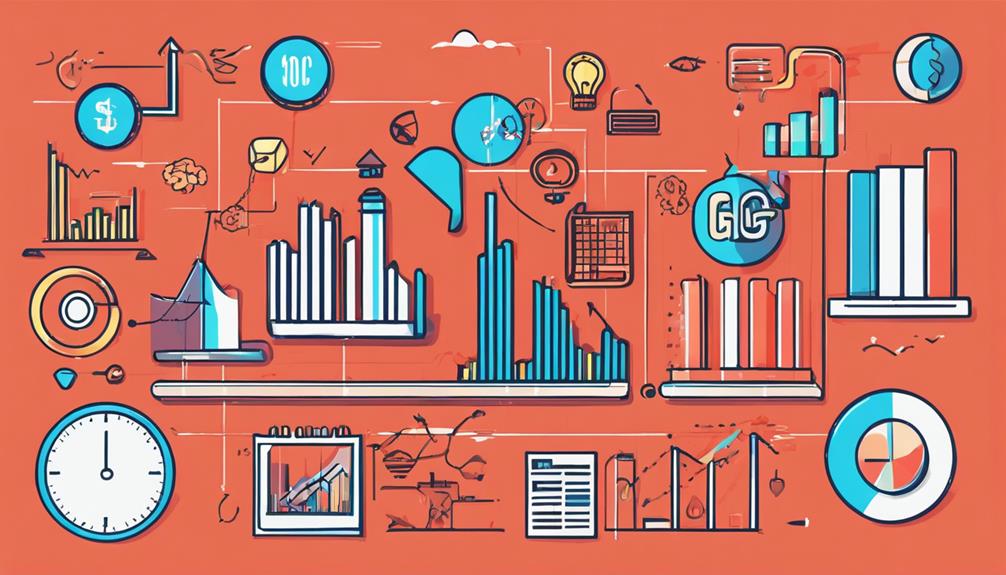Economy, a term often tossed around in daily discourse, holds a far more intricate web of interactions than meets the eye. It serves as the heartbeat of societal function, orchestrating the dance between production, distribution, and consumption. Delving into the nuances of what really constitutes an economy uncovers a world where market forces and government intervention collide, shaping the very fabric of our daily lives. But what lies beneath this complex tapestry of economic interactions? Let's unravel the layers to understand the intricate mechanisms driving the economic engine that fuels our existence.
Key Takeaways
- An economy governs production, distribution, and consumption of goods and services.
- Economic systems include market, command, and mixed economies influenced by culture and history.
- Economic principles involve resource allocation, organization of production, and impact of decisions on pricing.
- Economic indicators like GDP, unemployment rates, and inflation measure economic impact and performance.
Definition of Economy

An economy can be defined as the intricate system governing the production, distribution, and consumption of goods and services within a specified region. This system involves the efficient allocation of resources, creation of wealth, and utilization of labor to meet the needs and wants of society. Production refers to the process of creating goods and services, distribution involves the transportation and delivery of these goods to consumers, while consumption represents the final use of these products by individuals or organizations.
The economy functions as a complex network where various factors such as culture, laws, history, and geography influence its operations. It is a dynamic system that adapts to changes and challenges, aiming to achieve growth and stability. The term 'economy' finds its roots in the Greek word for household management, emphasizing the importance of efficient resource utilization.
Types of Economies
Examining the distinct characteristics of various economic systems reveals the fundamental differences in how resources are allocated and wealth is generated within societies. Market economies, driven by the forces of supply and demand, respond to consumer preferences and adjust production accordingly. In contrast, command economies are centrally planned, with the government controlling resource distribution. Most economies today are mixed, blending aspects of market and command systems to varying degrees. This hybrid approach aims to leverage the efficiency of market mechanisms while ensuring social welfare through government intervention.
China's transition from a command economy to embracing private enterprise in 1978 exemplifies the potential for significant economic growth when shifting towards market-oriented policies. Factors such as available resources, cultural norms, legal frameworks, historical contexts, and geographical considerations all play a role in shaping the economic system of a country. Understanding the nuances of different economic models is crucial for policymakers and citizens alike in navigating the complexities of modern economies and fostering sustainable development.
Key Economic Concepts

Understanding the foundational principles that underpin economic systems is essential for grasping the complexities of modern societies and fostering sustainable development. Economic concepts serve as the building blocks for comprehending how goods and services are produced, distributed, and consumed within a market economy. Key principles such as supply and demand dynamics dictate pricing mechanisms, influencing the availability and cost of goods and services. Moreover, the measurement of a country's economic performance through indicators like Gross Domestic Product (GDP) provides crucial insights into its overall economic health. Inflation, as a concept, highlights the gradual erosion of purchasing power, impacting the affordability of goods and services over time. Additionally, organized labor's advocacy for improved economic conditions underscores the importance of social factors in shaping economic landscapes. These fundamental economic concepts collectively shape decision-making processes and policy formulation, driving progress and prosperity within societies.
Economic Indicators
Economic indicators play a crucial role in understanding the health and performance of an economy. Key indicators such as GDP, unemployment rates, and inflation provide valuable insights into market conditions and help forecast economic trends. By analyzing these indicators, policymakers, investors, and businesses can make informed decisions to navigate the complexities of the economic landscape.
Key Economic Indicators
Key economic indicators play a crucial role in providing insights into the overall health and performance of an economy.
- Gross Domestic Product (GDP) measures the total value of goods and services produced in an economy.
- Unemployment reports track changes in the number of people working over time.
- Inflation and deflation are measured through indicators like the Consumer Price Index.
- Balance of trade compares money spent on imports to money earned from exports.
- The U.S. GDP reached $26.5 trillion in 2023.
Understanding these key economic indicators is essential for policymakers, investors, and the general public to gauge the economic conditions, make informed decisions, and predict future trends in the economy.
Impact on Markets
The analysis of economic indicators and their influence on markets is essential for comprehending the interconnectedness of economic activities and financial outcomes. These indicators, such as consumer spending, unemployment reports, inflation and deflation, and the balance of trade, play a crucial role in determining market value and shaping investment decisions.
| Economic Indicators | Definition | Importance |
|---|---|---|
| Consumer Spending | Measures the total amount individuals spend on goods | Drives economic growth and indicates consumer confidence |
| Unemployment Reports | Tracks changes in the number of people working | Reflects the health of the job market |
| Inflation and Deflation | Indicates changes in purchasing power | Affects interest rates and investment decisions |
| Balance of Trade | Compares money spent on imports to money earned from exports | Influences economic stability and growth |
Forecasting Economic Trends
Analyzing Gross Domestic Product (GDP) is a fundamental practice for projecting future economic trends and assessing a nation's economic performance.
- Unemployment rates provide insights into labor market conditions and potential shifts in consumer spending.
- Inflation rates, tracked through indicators like the Consumer Price Index, help predict changes in purchasing power and overall economic stability.
- Balance of trade data reveals the difference between a country's exports and imports, impacting currency strength and economic growth.
- Understanding economic indicators like GDP, unemployment, inflation, and trade balances is essential for making informed forecasts about future economic trends.
History of Economy
Throughout the annals of human civilization, the development and evolution of economies have played a crucial role in shaping societies and influencing cultural progress. The concept of 'economy' finds its roots in the Greek word for household management, indicating the early focus on resource allocation and management within communities. Ancient Sumer and Babylonians were pioneers in developing economic systems, utilizing commodity money and establishing business practices. These early economies heavily relied on subsistence activities such as bartering and social relationships to facilitate exchanges of goods and services. Mesopotamia introduced the Shekel as a unit of weight and currency, marking a significant step towards standardized monetary systems. Noteworthy contributions to economic discussions and institutional innovations were made by ancient civilizations like Greece and China, laying the groundwork for the complex economic structures we observe today. The historical evolution of economies showcases how fundamental principles of resource management and exchange have been integral to societal progress and cultural development.
Basics of Economics

The basics of economics encompass fundamental economic principles and key concepts that form the foundation of how economies function. These concepts provide a framework for understanding the production, distribution, and consumption of goods and services within a society. By exploring these principles, we can gain insights into the dynamics that drive economic activities and shape the overall well-being of individuals and communities.
Economic Principles Overview
Economics serves as the foundational framework that elucidates the intricate workings of societies' production, distribution, and consumption systems.
- Types of Economies: Different economic systems like capitalism, socialism, and mixed economies shape how resources are allocated.
- Economic System: The structure in which production, distribution, and consumption are organized within a society.
- Production and Consumption: The processes of creating goods and services, as well as using them to satisfy needs and wants.
- Economic Activity: The actions individuals, businesses, and governments take to produce, distribute, and consume goods and services.
- Economic Decisions: Choices made regarding resource allocation, pricing, investment, and other economic matters that impact society.
Key Economic Concepts
Building upon the fundamental economic principles outlined in the previous discussion, the exploration of key economic concepts delves into the foundational pillars that underpin the intricate workings of modern economies. Economies can take various forms, including traditional, market-based, command, and mixed economies, each influenced by government policies and regulations. Governments play a crucial role in shaping economic activities through fiscal and monetary policies, while also establishing laws of supply and demand that govern the production and distribution of goods and services. The law of supply states that as prices increase, the quantity of goods supplied also rises, whereas the law of demand indicates that as prices increase, the quantity demanded decreases. Wealth, comprising tangible and intangible assets, serves as a measure of economic prosperity and plays a significant role in driving economic growth and development.
Micro Vs. Macroeconomics
An essential distinction in the field of economics lies between the analysis of individual economic behaviors and choices versus the examination of economy-wide factors, known respectively as microeconomics and macroeconomics.
- Microeconomics focuses on individual behavior and choices within the economy, such as consumer preferences and production decisions.
- Macroeconomics examines economy-wide factors like inflation, GDP, unemployment, and overall economic performance.
- Macroeconomics uses indicators such as GDP growth rates and unemployment rates to assess the health of an economy.
- Understanding microeconomics helps in analyzing how individual decisions impact the larger economic system.
- Macroeconomics provides a broad view of the economy by analyzing aggregate trends and policies affecting the entire economic system.
Microeconomics delves into the specific behaviors of consumers, firms, and industries, while macroeconomics looks at the overall performance and health of the economy. Both are crucial in providing a comprehensive understanding of how individual decisions interact with broader economic trends.
Economics in Society

The functioning of societies is intricately intertwined with the economic systems that govern the production, distribution, and consumption of goods and services within them. Economic activities in a society play a vital role in shaping its overall growth, development, and the standard of living for its members. The table below illustrates the key aspects of how economics influences society:
| Economic Aspect | Description | Importance |
|---|---|---|
| Production | The process of creating goods and services using resources and labor. | Drives economic growth and provides employment opportunities. |
| Distribution | The allocation and delivery of goods and services to consumers and markets. | Ensures that products reach those who need them efficiently. |
| Consumption | The utilization of goods and services by individuals and households. | Drives demand for products, influencing production and distribution. |
Understanding the dynamics of economic production, distribution, and consumption is crucial for comprehending how societies function and evolve. The interplay between these elements shapes the economic landscape and impacts the well-being of individuals within a society.
Modern Economic Development
Modern economic development is intricately influenced by a myriad of factors including technological advancements, policy decisions, and global market dynamics.
- The U.S. GDP reached $26.5 trillion in 2023, showcasing the scale of economic activities in the modern era.
- Industrial production, a key component of modern economic development, has driven economic growth and innovation.
- China's transition from a command economy to encouraging private enterprise in 1978 led to substantial economic growth, exemplifying the impact of policy decisions.
- Economies are shaped by resources, culture, laws, history, and geography, all playing pivotal roles in influencing their development.
- Globalization, which gained momentum after the Great Depression and World War II, has significantly impacted economic interactions worldwide, shaping the landscape of modern economic development.
These interconnected factors underscore the complexity and dynamism of modern economic systems, highlighting the importance of understanding the various elements at play in fostering economic growth and stability on a global scale.
Real-Life Economics

Real-life economics delves into the practical applications of economic principles, examining how these principles impact society at large. By understanding the real-world implications of economic theories, we can better comprehend the complexities of resource allocation and consumption patterns within different groups. Analyzing these practical aspects helps us assess the success and challenges faced by economies in their pursuit of growth and stability.
Economic Principles Explained
In understanding economic principles, it is crucial to analyze the intricate interplay between production, consumption, and resource allocation within a given group or region.
- Market-based economies respond to consumer demand.
- Command-based economies are regulated by a central government.
- Most economies today are mixed, combining elements of both market-based and command-based systems.
- China's shift from a command economy to encouraging private enterprise in 1978 led to significant economic growth.
- Economies are shaped by various factors such as resources, culture, laws, history, and geography.
Understanding these economic principles helps elucidate the diverse approaches to resource allocation and the influence of central government in shaping economic systems.
Impact on Society
The influence of economies on society is profound, manifesting through the shaping of employment opportunities, income levels, and overall living standards. Changes in economic policies can lead to shifts in social welfare programs and access to essential services. Economic downturns resulting from fluctuations in economic indicators can lead to increased poverty rates, homelessness, and mental health issues within communities. Conversely, economic growth can enhance educational opportunities, healthcare services, and infrastructure development for the population. Societal well-being is closely linked to economic stability, with economic fluctuations significantly affecting people's daily lives.
| Economic Impact | Examples |
|---|---|
| Production of Goods | Job creation, increased GDP |
| Consumption of Goods | Consumer spending patterns, market demand |
| Social Welfare Programs | Healthcare subsidies, unemployment benefits |
| Economic Stability | Inflation rates, interest rates |
Practical Applications
Applying economic principles in everyday decision-making processes allows individuals and businesses to navigate financial challenges with informed strategies and adaptability.
- Real-life economics involves budgeting, investing, and making purchasing decisions.
- Understanding supply and demand dynamics helps in informed choices about buying and selling goods and services.
- Economic indicators like inflation rates or unemployment figures provide insights into the health of an economy.
- Economic theories such as the law of diminishing returns assist businesses in optimizing production and maximizing profits.
- Studying economic trends and shifts aids in adapting to changing market conditions and making strategic decisions.
Importance of Economy

Essential for wealth creation, resource allocation, and societal well-being, the economy plays a pivotal role in shaping the fabric of a society. Through efficient resource utilization, economies drive economic growth, leading to increased standard of living and improved employment opportunities. The importance of the economy extends beyond individual prosperity to encompass sustainable development and overall societal progress.
To provide a deeper understanding, the table below highlights key aspects of the economy:
| Key Aspects | Importance |
|---|---|
| Wealth Creation | Generates income, fosters investment, and improves overall prosperity. |
| Resource Allocation | Ensures efficient distribution of resources for optimal societal benefit. |
| Standard of Living | Reflects the quality of life, access to goods/services, and well-being. |
| Economic Growth | Indicates the expansion of production capabilities and overall prosperity. |
Understanding the significance of these aspects enables individuals to make informed decisions, contribute to sustainable development, and drive progress within their society. A strong economy not only enhances stability and competitiveness at the national level but also elevates a nation's standing in the global arena.
Frequently Asked Questions
What Is a Simple Definition of Economy?
An economy, in its simplest form, can be defined as the system through which a society manages its resources, production, and consumption. Basic principles of economics revolve around supply and demand dynamics, resource allocation efficiency, and achieving market equilibrium. Understanding economic systems involves analyzing how these principles interact to ensure the effective distribution of goods and services to meet societal needs while optimizing overall welfare and living standards.
What Is Simple Definition of Simple Economy?
A simple economy can be defined as a basic economic system where individuals exchange goods and services directly without the use of money. It operates on the principles of bartering, with goods traded for other goods. This system lacks complex financial institutions and relies on direct exchanges between individuals or groups. In simple economies, the focus is on the production process, resource allocation, and market dynamics to facilitate trade and meet basic needs efficiently.
What Is Economies in Simple Words?
Basic concepts of economies include economic systems, market dynamics, resource allocation, and wealth distribution. Economic systems define how societies organize and manage production, distribution, and consumption. Market dynamics refer to the interactions of supply and demand that influence prices and production levels. Resource allocation involves deciding how to distribute limited resources efficiently. Wealth distribution concerns how income and assets are divided among individuals and entities within a society.
What Is an Example of an Economy?
An example of an economy is a market economy, where resources are allocated based on supply and demand mechanisms driven by consumers and businesses. In contrast, a command economy centralizes resource allocation decisions in the hands of a governing authority. These contrasting economic models showcase how different systems manage resources and shape production and consumption patterns within a society.
Conclusion
In conclusion, the economy is a multifaceted system encompassing production, distribution, and consumption of goods and services. Understanding the types of economies, key economic concepts, indicators, and historical development is crucial for comprehending the role of economics in society. The importance of the economy cannot be overstated, as it shapes the livelihoods of individuals and the overall well-being of nations.
